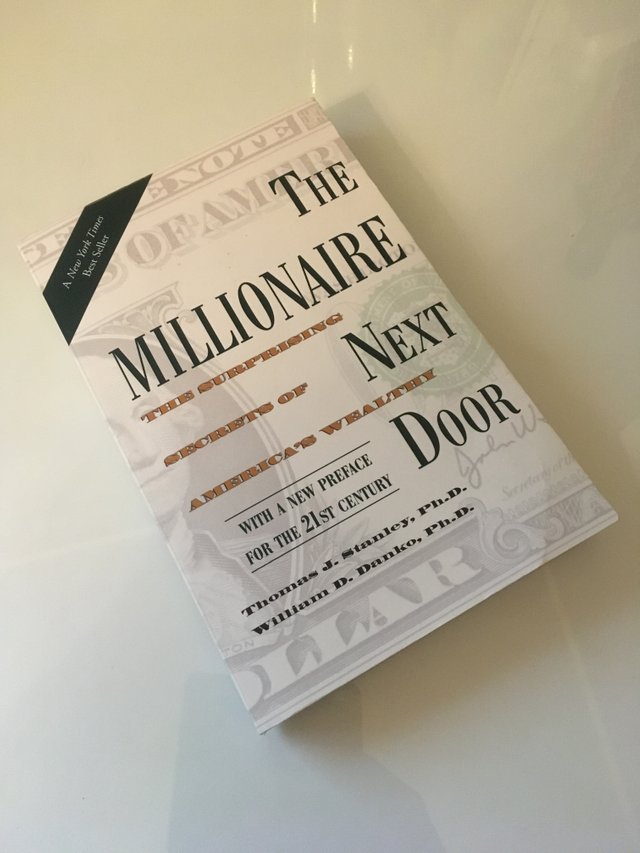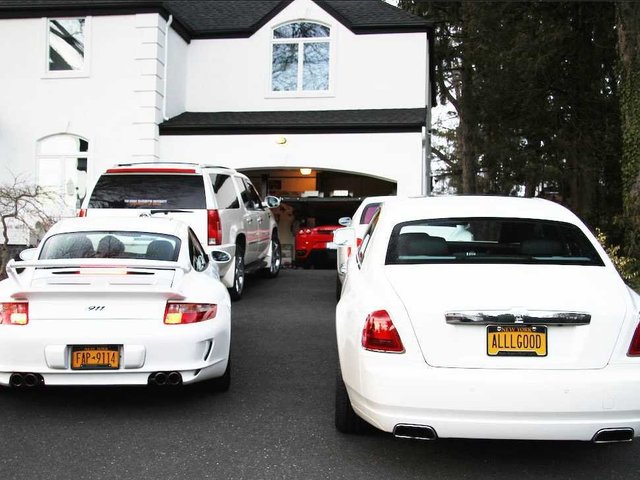Who are the real millionaires next door?

Howdy friends!
When thinking about millionaires you are probably thinking about the movie stars from MTV Cribs (is that show still on?), successful athletes driving fancy sportscars, politicians in Italian tailor-made suits,...
And you probably wonder : Who are the rich? What do they do? Where do they shop? What do they drive? How do they invest? Why aren´t I as wealthy as I should be with my "six-figure income"*? Can I ever become one of them?...
Well, Guess what! I am more than happy to answer all of these questions...with the help of Thomas Stanley and William Danko who wrote the best-seller "The Millionaire Next Door : The Surprising Secrets of America´s Wealthy".
The Millionaire Next Door was first published in 1996 and is an eye-opening book about how most people have it all wrong about how you become wealthy. The authors did a 20-year extensive study of more than a 1000 millionaires - people with a verifiable net worth of $1 million or more - and drew conclusions on what factors lead to their financial success.
The book is articulated around the 7 common traits rich people have that Stanley and Danko identified, however before we dig into these let us define wealth.
How is wealth defined?
For some it simply means having plenty of material possessions. Just be aware that someone displaying a lavish lifestyle and has high expenses does not necessarily have a high level of wealth. Wealth is defined as one´s net worth : the current value of one´s assets minus liabilities. In the book, being wealthy means having a net worth of $1 million.
Becoming a millionaire by accumulating wealth is a slow process that takes years to achieve, it does not happen overnight. Here is the typical millionaire as studied by the authors.
“(He is) a businessman who has lived in the same town for all of his adult life. This person owns a small factory, a chain of stores, or a service company. He has married once and remains married. He lives next door to people with a fraction of his wealth. He is a compulsive saver and investor. And he has made his money on his own.”
I know, you maybe expected something more glamorous here, right?
Are you wealthy?
The formula below will determine your expected net worth :

Let´s call the result X and your net worth YNW. This gives us three cases :
You are an under accumulator of wealth (UAW) if YNW<x/2
You are an average accumulator of wealth (AAW) if X/2<YNW<2X
our are a Prodigious Accumulator of Wealth if YNW>2X, Congratulations!
Here is an example : If you are 35 years old with a total household income of $70,000, your expected net worth according to the formula is $245,000 – If you have $550,000 in the bank you are a Prodigious Accumulator of wealth (PAW), if you "only" have $100,000 worth in stocks your are an Under Accumulator of Wealth.
Try it for yourself! Are you a PAW, a AAW or UAW? I have tried and am just below my expected net worth, darn it! Anyway, use the formula with a grain of salt, you will easily find out the flaw here : The older you are the more likely you will become a PAW and vice-versa.
And now to the 7 traits millionaires have in common.
1. They live well below their means - They are frugal, frugal, frugal
After having let the book "rest" for one month this is the single trait I remember the best since it is hammered throughout the book.
The wealthy couldn't care less about flaunting their wealth, they are not who you think they are. They are simple people like you and me. They drive cheap cars, wear max $600 suits, $200 shoes, $235 watches (!),...yes they may actually even spend less than you and me on those items!
Millionaires' wives are all frugal too. On page 37, one millionaire gives his wife $8 millions worth of stocks and she responds by saying : "I appreciate this, I really do." while she continues to cut the food coupons in the newspapers. That is what she has always done and one of the reasons they are well-off today the husband millionaire says.
Living below your means is absolutely crucial in order to build wealth.
Allow me to quote the Micawber principle from the book David Copperfield which illustrates this :
“Annual income twenty pounds, annual expenditure nineteen six, result happiness. Annual income twenty pounds, annual expenditure twenty pound ought and six, result misery.” ― David Copperfield, Charles Dickens
In less poetic terms think of it this way : Who do you think is more likely to end up in trouble? A couple of teachers earning $60 000 and spending $50 000 a year or a Marketing Manager earning $110 000 a year and spending $115 000 a year?
2. They allocate their time, energy, and money efficiently, in ways conducive to building wealth
Financial planning is paramount for Millionaires. Typical PAWs take the time to plan their budgets while UAW have no control on their household budget.
3. They believe that financial independence is more important than displaying high social status
From this point the book started to get lengthy. This part is only about the millionaires car-shopping methods, we get it : shop around and get the best possible value for money on a used car.

The only interesting story I personally take out from this chapter is the "No Rolls-Royce, Please" anecdote : Mr. Allan a super-PAW is to be given a Rolls-Royce as a present, however he refused the wonderful gift. He would have had to change his lifestyle completely just because of this status object : He would feel uncomfortable going fishing in a Rolls, driving to his office and being seen by his employees, he can´t drive up in a Rolls-Royce to some of the crummy restaurants he enjoys going to,..
4. Their parents did not provide economic outpatient care
Economic Outpatient Care refers to economic gifts and "acts of kindness" to children or grandchildren. Most millionaires made it on their own without the help of their parents. The authors found out that "the more dollars adult children received, the fewer they accumulated, while those who are given fewer dollars accumulate more”. Let´s not weaken the weak by helping them financially.
Here are 3 out of the 10 tips I thought important to share here :
1. Teach discipline and frugality to your children (Surprise!)
2. Minimize discussions of the items that each child and grandchild will inherit or receive as gifts
3. Tell your children that there are a lot of things more valuable than money
5. Their adult children are economically self-sufficient
The authors clearly believe that giving money to adult children will impair their chances to succeed. The wealthy that support their adult children financially reduce their children´s net worth.
6. They are proficient in targeting market opportunities
“Very often those who supply the affluent become wealthy themselves.” The authors show us that those who sell products to the affluent may become wealthy themselves. According to them these professions are the most likely to benefit the wealthy : Attorneys who specialize, Lawyer, Doctors, Dentists, Real Estate Management Professionals,...
7. They chose the right occupation
Most of the affluent are business owners and these "are four times more likely to to be millionaires than those who work for others". However do not be fooled, they own the simplest businesses you can think of : They sell kitchens, they are dentists, they sell shoes,... there is no magic formula or one single type of business that will make you wealthy. It is the character of the business owner that will define his level of wealth.
This extract from a Forbes´article sums it all up :
"Dull companies with steady earnings growth may not make for stimulating cocktail party chatter, but over the long term they make the best investments" ― Fleming Meeks and David S. Formdiller, "Dare to Be Dull," Forbes, Nov. 6, 1995, p.228
My impression on the book

The message of the book is loud and clear : Be Frugal, invest and the most important to us all : you too could become the Millionaire Next Door!
At first I was really into it, it was interesting to see how the authors challenged the traditional view of what the pop culture tells us : Simple and "dull" everyday people amassing wealth dilligently vs. Rock Stars in Mac Mansions driving Lamborghini´s.
I embrace my own frugal lifestyle and my mind is not preoccupied by showing any signs of riches to others. While reading I grew highly motivated to cut more on my own spendings in order to create more wealth. However some anecdotes from the booked damped this excitement. On page 160, we can read about Susan and Berl who lived a frugal and happy life but for example they have never been on skis nor have traveled abroad. This is where it hit a sensitive chord in me : Even though frugality and amassing wealth in order to be more self-sufficient in the long-term are healthy financial goals, in my opinion you should spend on experiences and things you are passionate about. Travelling, in my opinion is the only thing you buy that makes you richer, has always been part of my life and I encourage everyone to experience travelling abroad as much as you can (within your means of course). So personally I will not follow every single principle of this book.
Should you buy it?
What I especially like about the book is that based on facts it shows who the millionaires really are and how that challenges the common perception. The book is not a "How to" guide but it describes the strategies to build up wealth slowly through frugality and careful financial planning.
The book is perfect for those starting with Personal Finance and those interested in long-term financial planning and you can purchase the book for a mere $10 on Amazon.
I would nonetheless rather recommend it to a more senior audience. If you are in your early 20´s your first priority will be on building a solid financial foundation for the future, not reading about how you need to deal financially with your adult children. For the "millennials" among us, starting with Rami Sethi´s I Will Teach You To Be Rich is a better option. You can even read the first chapter here for free!
All in all I enjoyed reading the book and to me the book is a must read.
So friends, what are your thoughts? Is your neighbour, high school teach, uncle a Millionaire Next door? Have you read the book, what did you think of it?
If you liked this article, do follow us on social media as well for more great content, check our Facebook, Instagram, Twitter, and join our e-mail list. I would love to connect with you!
Disclosure: This post may contain affiliate links. That means I may make a small commission (at no cost to you) if you make a purchase. This will help to support Joney Talks!
Salaries above 100 000 USD gross
Thanks to Lynn from www.successful-sahm.com for letting me use your image!